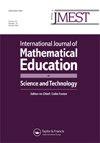Cultural values and prospective teachers’ beliefs about success in mathematics and in its teaching
IF 0.6
Q3 EDUCATION & EDUCATIONAL RESEARCH
International Journal of Mathematical Education in Science and Technology
Pub Date : 2023-05-02
DOI:10.1080/0020739X.2023.2203159
引用次数: 0
Abstract
International literature is increasingly disclosing the relevance of cultural aspects within the processes of teaching and learning mathematics. Knowledge is inextricably linked to the activities in which the subjects engage, and must be considered in relation to the socio-cultural context wherein the activity takes place. Literature reveals the relationship between the background culture (e.g. language, nationality, etc.) of prospective elementary teachers and their beliefs about mathematics and its teaching. In this paper, we define culture with reference to the wider discussion from cross-cultural psychology literature about cultural values, and we investigate if and how differences in individuals’ cultural values are related to prospective teachers’ beliefs about being successful in mathematics and in its teaching. We adopt a questionnaire from the studies by Schwartz to measure participants’ values. We assign each prospective teacher of our sample to a cluster of beliefs and we analyse how the beliefs of prospective teachers are related to their values. Results show that cultural values and beliefs about mathematics are related, while this is not the case for beliefs about the teaching of this subject.文化价值观和未来教师对数学及其教学成功的信念
国际文学在数学教学过程中越来越多地揭示了文化方面的相关性。知识与主体参与的活动有着千丝万缕的联系,必须考虑到活动发生的社会文化背景。文献揭示了未来小学教师的背景文化(如语言、民族等)与他们对数学及其教学的信念之间的关系。在本文中,我们参考跨文化心理学文献中关于文化价值观的更广泛讨论来定义文化,并研究个人文化价值观的差异是否以及如何与未来教师对数学和教学成功的信念相关。我们采用Schwartz研究中的问卷来测量参与者的价值观。我们将样本中的每个准教师分配到一组信念中,并分析准教师的信念与他们的价值观之间的关系。结果表明,文化价值观和对数学的信念是相关的,而对这门学科教学的信念则不是这样。
本文章由计算机程序翻译,如有差异,请以英文原文为准。
求助全文
约1分钟内获得全文
求助全文
来源期刊

International Journal of Mathematical Education in Science and Technology
EDUCATION & EDUCATIONAL RESEARCH-
CiteScore
3.30
自引率
11.10%
发文量
123
期刊介绍:
Mathematics is pervading every study and technique in our modern world, bringing ever more sharply into focus the responsibilities laid upon those whose task it is to teach it. Most prominent among these is the difficulty of presenting an interdisciplinary approach so that one professional group may benefit from the experience of others. The International Journal of Mathematical Education in Science and Technology provides a medium by which a wide range of experience in mathematical education can be presented, assimilated and eventually adapted to everyday needs in schools, colleges, polytechnics, universities, industry and commerce. Contributions will be welcomed from lecturers, teachers and users of mathematics at all levels on the contents of syllabuses and methods of presentation.
 求助内容:
求助内容: 应助结果提醒方式:
应助结果提醒方式:


